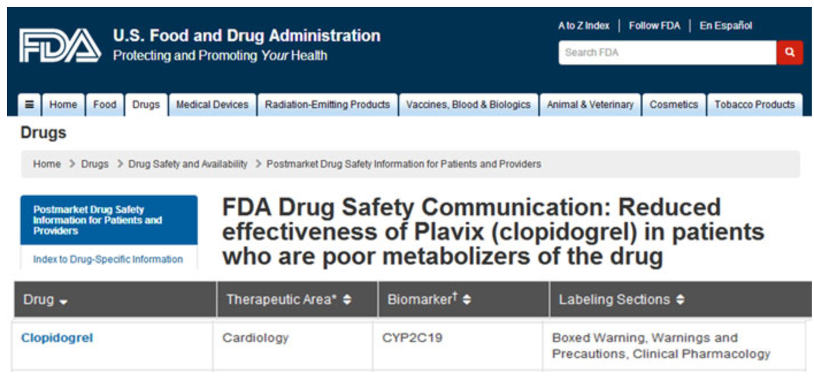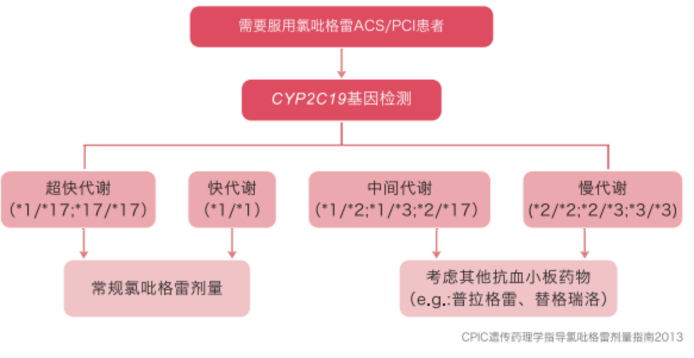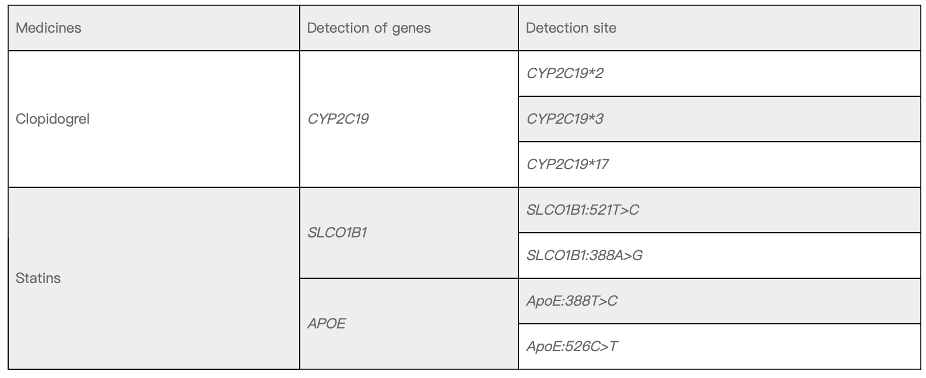Different individuals have different reactions to clopidogrel. About 40% of Asian patients have clopidogrel resistance, mainly due to CYP2C19 gene mutations that cause metabolic weakness. CYP2C19 has at least 36 alleles, of which CYP2C19*2 and CYP2C19*3 account for more than 99% of the weak metabolic phenotypes in the Asian population. CYP2C19*17 is the only genotype with ultra-fast activity found so far. In weakly metabolized individuals caused by CYP2C19 gene mutations, clopidogrel antithrombotic effect is poor, and the risk of cardiovascular and cerebrovascular events increases. For such individuals, it is necessary to increase the dose of clopidogrel or switch to other antiplatelet drugs for treatment to achieve the effect of inhibiting platelet aggregation.
In 2010, the FDA issued a black-frame warning, clearly recommending that doctors conduct CYP2C19 genotyping tests for patients who will take clopidogrel, and implement personalized drugs for patient genotypes.

The CYP2C19 genotype and clopidogrel treatment guidelines released by the Clinical Pharmacogenomics Implementation Alliance (CPIC) also suggest that CYP2C19 genotype can be tested for ACS patients undergoing PCI surgery to guide the use of clopidogrel.

The CPIC Guidelines for Pharmacogenetics and the Technical Guidelines for Gene Detection of Drug Metabolic Enzymes and Drug Action Targets (Trial) issued by the National Health and Family Planning Commission all point out that SLCO1B1 and ApoE gene polymorphisms affect the metabolic level of statins, and doctors can guide patients to statins according to their gene polymorphisms. Take the dose to reduce the risk of myopathy. Studies have shown that the concentration of statins in the same daily intake of simvastatin and SLCO1B1 homozygous mutant is significantly higher than that of wild and heterozygous muta, and the probability of myopathy is much higher than that of the latter.

The polymorphism of the two locuses of the human ApoE gene (388T>G/526C>T) can form three haplotypes: ApoE2/ApoE3/ApoE4. Studies have shown that ApoE gene polymorphism is significantly related to lipid-lowering effect.


Clopidogrel is an antiplatelet agglutination drug widely used in clinic, which is used in the prevention and treatment of hemostatic stroke, myocardial infarction or symptomatic peripheral arterial disease. Statins are the most effective lipid regulating drugs. By competitively inhibiting cholesterol, they synthesize the speed-limiting enzyme HMG-CoA reductase, block the intracellular hydroxymethylcarboxylic acid metabolic pathway and reduce intracellular cholesterol synthesis. They have become the most effective drugs for the prevention and treatment of coronary heart disease, including atorvastatin, risuvastatin and Luo Valvatin, simvastatin, valstatin, fluvalstatin, etc.
No need to extract DNA, save time and effort, reduce pollution.
Combined testing of conventional hypertension drugs and folic acid related drugs, 1 tube amplification, the whole process only needs 3h.

2-4 ml EDTA anticoagulant blood, ≥50mg chorion sample, ≥100mg tissue sample (transported and stored at 2-4°C)
Blood stains ≥2cm2 stored in the blood card (transported and stored at room temperature)
PCR instrument and genetic analyzer (MicroreaderTM Genetic Analyzer 7010, ABI PRISM® 310, 3100 Genetic Analyzer or ABI 3130 Series, 3500 Series, 3730 Series Genetic Analyzer)
1. Simon T, et al. N Engl J Med. 2009 Jan 22;360(4):363-75.
2. SA Scott, et al. Clinical Pharmacogenetics Implementation Consortium Guidelines for CYP2C19 Genotype and Clopidogrel Therapy: 2013 Update. Clin Pharmacol Ther. 2013 Sep;94(3):317-23.
3. " Technical Guidelines for Gene Detection of Drug Metabolic Enzymes and Drug Action Targets (Trial)
4. Mikko Niemi et al.,2011,Pharmacol Rev 63:157–181.
5. Thompson et al., Circ Cardiovasc Genet. 2009;2:173-181.
※ This information is only for the reference of relevant medical professionals.
※For research purposes only